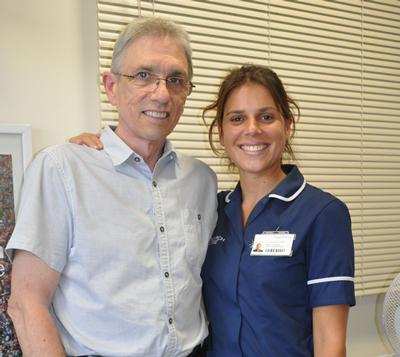Beating cancer from within

Michael Knowlton was the first person in the world to test a potential vaccine for his type of head and neck cancer (HPV 16) as part of an immunotherapy clinical trial by the University of Southampton.
There is no guarantee that the course of injections Michael agreed to have will one day save his life, but the 63-year-old is willing to try.
When he rolled up his sleeve to receive the first jab as part of a University of Southampton clinical trial, Michael was, however, sure of one thing – he was making medical history.
The company director was the first person to have what could go on to be a vaccine against the type of cancer with which he was diagnosed two years earlier.
It was an irritating cough which first prompted Michael to visit his doctor in 2014. Tests went on to confirm it was cancer. What followed was a difficult procedure by Professor Emma King to remove the tumour from the back of his tongue which left him in intensive care with a tracheostomy.
At the end of gruelling rounds of chemo and radiotherapy he was told should the cancer return, his options for further treatment were limited and he could well be facing a life-changing operation which would severely impact his quality of life.
Michael, who lives in Poole, said: “I was told there wasn’t much else that could be done if it came back, I couldn’t have any more chemo or radiation and that was a bit of a kicker.
“You think there has got to be a way so I asked if there was a research program I could get on rather than sit and wait for nature to take its course.”
Michael was referred to a cancer immunotherapy clinical trial by the University of Southampton which was developing a vaccine for the type of head and neck cancer called HPV 16 which he had been diagnosed with.
He says: “When I found out I was a candidate, as the trial was for the type of viral cancer which I had, for me that was like all my lottery numbers coming in at once.”
Michael took part in the first phase of the trial which recruited disease-free patients to establish how they reacted to the vaccine in terms of side effects and to establish dose levels, before it will eventually be tested in patients who are at the advanced stage of the disease.
The father of three said for him it was a ‘no-brainer’ when told he would be the first person to receive the vaccine.
He says: “There was no way you would be foolish to say, no I don’t want any of that. Yes, there was a risk factor but you have to go for it you have got nothing else.
“You have to either wait for nature to take its course or you do something about it. I just don’t take no for an answer.”
The HARE-40 trial was developed from research undertaken at the University by Professor Christian Ottensmeier and funded by Cancer Research UK in partnership with the University.
The vaccine uses a type of immunotherapy which ‘kick-starts’ the immune system to recognise the HPV16 cancer and destroy it before it has a chance to develop.
Michael, whose parents and wife’s parents passed away through cancer, added: “It was exciting to be the first, it felt that I was contributing more than I originally thought. It wasn’t just selfishness that I wanted it for myself it was for my kids, the next generation.”
University of Southampton research sister Cristiana Goncalves, said the excitement when the clinical trial began was palpable.
“I was very excited to see Michael there. We know that all the tests have been done but we want to know what the side effects are so when Michael started reacting four to six hours post dose, we knew that this was happening for real.
“People like Michael are really special, these patients are all volunteers and Michael is currently disease-free. He doesn’t need to do this, it is purely for research which makes them even more special.”
Cristiana added: “To think that in ten or 20 years’ time we might be able to vaccinate kids or teenagers and that might prevent head and neck cancer from happening then that makes us happy to come to work and do these trials.”
It is this unique arrangement of action-led research which is developed into clinical trials all happening right here in Southampton that has established the University as world-leaders in the field of cancer immunotherapies.
This reputation is set to be further enhanced with the opening of the Centre for Cancer Immunology next year. The first of its kind in the UK, and wholly funded through philanthropy, it will provide cutting edge facilities and become home to pioneering researchers from a range of fields collaborating under one roof.
Michael said: “You have got to be so proud that it is here in Southampton. Everyone can feed off each other and lessons learned in one department could be converted to the benefit of other trials, simply by the fact they are all happening in one place.”
Research sister Kerry Gready says the potential for students to benefit in the unique learning environment and the potential to expand and enhance the clinical trials available to patients is an exciting new chapter for the University.
She says: “It is the knowledge and expertise that are on tap just from being in this environment that is the difference. It just buzzes with enthusiasm, people all over the world are here in these buildings.
“Not only will our students be taught this incredible knowledge but they will also get to see how inspired and motivated people are to be working here that you are not going to get anywhere else in the country.”
Click here to find out more about the University’s campaign for the Centre for Cancer Immunology.